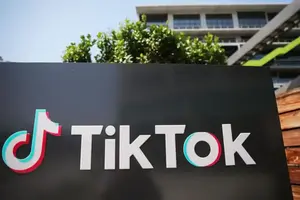
On most days, companies like ByteDance, Microsoft, Walmart and Oracle are considered kings within their fields. But over the weekend, it became increasingly clear that they can also be something else: a set of pawns.
The industry titans have been caught in an escalating tit-for-tat between the United States and China over the sale of the US operations of TikTok, the viral social media app owned by Chinese Internet company ByteDance. The sale was ordered in early August by President Donald Trump, who said TikTok posed a national security threat because of its Chinese ties.
For weeks, China was critical of Mr Trump's order but stayed quiet on what it would do about it. That allowed ByteDance and TikTok to pursue sale talks with potential bidders like Microsoft, Walmart, Oracle and others.
Then over the weekend, Beijing threw the whole process for a loop when it updated its export control rules to include some of TikTok's key technologiesa sign that the Chinese government could exert its authority to delay or scuttle any deal at the last minute.
Now a blockbuster deal that had been set to be completed soon has become far more complicated, according to three people close to the talks. The two groups vying to buy TikTok's US businessone is an alliance between Microsoft and Walmart, and the other is an offer led by Oracleare discussing how to interpret China's new rules and how to move forward, said the people, who were not authorised to speak publicly.
At the same time, the bidders are honing drafts of their offers and tweaking them as part of the negotiation process, the people said.
"Certainly this deal and high tech in general is now inherently politicised, and there's no escaping it," said Mr Scott Kennedy, a China expert at the Centre for Strategic and International Studies. "As long as the US and China have such low trust of each other, the way TikTok is being treated, and the way American companies may be treated in China, may become the new normal."
He added, "We've passed the threshold where we feel confident we're able to mitigate these kinds of risks between each other, and regular companies are being caught in the middle."
Ms Samm Sacks, a cyberpolicy fellow at the think tank New America, said the Trump administration was likely to counter China's latest move with its own, and that more US companies operating in China could be in an increasingly precarious position. "This is just the tip of the iceberg," she said.
Representatives for Microsoft, Oracle and Walmart declined to comment.
"We're studying the new regulations that were released Friday," Mr Erich Andersen, ByteDance's general counsel, said in a statement. "As with any cross-border transaction, we will follow the applicable laws, which in this case include those of the US and China."
In Washington, China's new export measures were widely seen as a potential poison pill for the TikTok deal. If China does move to block TikTok's sale, that could goad Mr Trump into taking harsher action, further escalating tensions between the US and China.
Already, the Trump administration has placed sanctions on dozens of Chinese companies in recent weeks over alleged security threats and human rights violations, and it's threatened to take more measures to block Chinese tech companies like Alibaba and Baidu from doing business in the US.
Mr Peter Navarro, the White House trade adviser known for his harsh criticism of China, said in an interview on Monday (Aug 31) that it was "critical" that Americans not use apps that are made in China because Beijing could use them to surveil, track and potentially even extort Americans.
"That's really the policy position underlying why we've gone after TikTok and WeChat and there will be others because China, communist China, the Chinese Communist Party, is basically going out around the world trying to acquire technology and influence," he said.
Of Mr Trump, he added, "This country and this president, the strongest president on China in history, is not going to put up with that."
Mr Navarro said he was not part of the negotiations over TikTok's sale, a deal that was being reviewed by the Treasury Department. The White House referred a request for comment to the Treasury Department, which did not respond.
Associate Professor Matt Perault from Duke University's Centre on Science and Technology Policy, said that the US and China had politicised other deals in the past, including Qualcomm's attempted acquisition of Dutch company NXP Semiconductors.
In 2018, Qualcomm terminated that deal after Chinese authorities did not grant antitrust approvals for the acquisition of NXP's China operations.
Even so, Assoc Prof Perault said the TikTok deal stood out because the US is on the eve of an election in which the president has made China a key component of his reelection strategy, and the company involved is one of the strongest competitors to US tech companies in a generation.
"The politicisation is having an immediate impact," Assoc Prof Perault said, adding that the degree of politicisation was "unique."
- NYTIMES